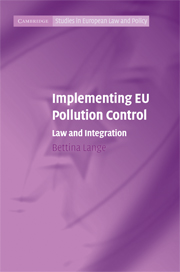Book contents
- Frontmatter
- Contents
- Series editors’ preface
- Acknowledgements
- Update on the IPPC Directive
- Abbreviations
- 1 Introduction
- 2 Traditional perspectives on the role of law in EU integration
- 3 Critical perspectives on the role of law in EU integration
- 4 What is EU ‘law in action’?
- 5 Talking interests – generating procedure: How political discourse constructs key aspects of BAT determinations in BREFs
- 6 Variation in open and closed BAT norms
- 7 What does it cost? Economic discourse in the determination of ‘the best available techniques’ under the IPPC directive
- 8 Does ‘law’ integrate? Licensing German and English coke ovens under the IPPC Directive
- 9 Conclusion
- Appendix: Methodology
- Bibliography
- Index
Appendix: Methodology
Published online by Cambridge University Press: 07 August 2009
- Frontmatter
- Contents
- Series editors’ preface
- Acknowledgements
- Update on the IPPC Directive
- Abbreviations
- 1 Introduction
- 2 Traditional perspectives on the role of law in EU integration
- 3 Critical perspectives on the role of law in EU integration
- 4 What is EU ‘law in action’?
- 5 Talking interests – generating procedure: How political discourse constructs key aspects of BAT determinations in BREFs
- 6 Variation in open and closed BAT norms
- 7 What does it cost? Economic discourse in the determination of ‘the best available techniques’ under the IPPC directive
- 8 Does ‘law’ integrate? Licensing German and English coke ovens under the IPPC Directive
- 9 Conclusion
- Appendix: Methodology
- Bibliography
- Index
Summary
The purpose of this appendix on methodology is to provide transparency in the research process and thus to facilitate critical evaluation of the research and its conclusions. It also seeks to contribute to debates about socio-legal research methods and their further development.
Reliability and validity of the data
Reliability and validity are key criteria which are often used to evaluate the quality of quantitative research in particular. Reliability assesses consistency in the data and hence whether the findings from the research can be replicated. Validity refers to whether the data really identify and measure what the research seeks to investigate (Bryman, 2001: 70, 270). These two key criteria require some adaptation for the evaluation of qualitative research. Both criteria reflect realist assumptions in so far as they expect research to reflect and replicate an objective social reality ‘out there’. Qualitative research, however, and discourse analysis in particular, challenge these realist assumptions, for they explicitly recognise that social actors and researchers themselves actively construct representations of social worlds. But the question whether particular data and data collection techniques have adequately captured the social world under investigation is still an issue in some accounts of qualitative research methods (see, for example, Hawkins, 2002: 449). Especially in the context of research which involves public bodies, such as regulatory authorities, the question whether documents and interview data include ‘presentational data’ is debated.
Information
- Type
- Chapter
- Information
- Implementing EU Pollution ControlLaw and Integration, pp. 292 - 303Publisher: Cambridge University PressPrint publication year: 2008
